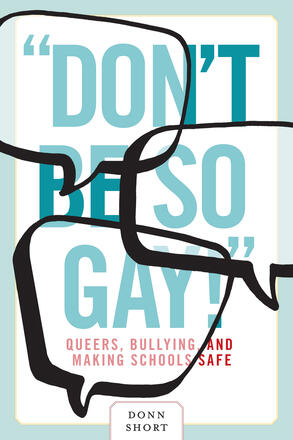
A timely and empowering work that gives GLBTQ youth a voice in addressing the problem of homophobic school bullying.
Description
Recent cases of teen suicide linked with homophobic bullying have thrust the issue of school safety into the national spotlight. In “Don’t Be So Gay!” Queers, Bullying, and Making Schools Safe, Donn Short considers the effectiveness of safe-school legislation. Drawing on interviews with queer youth and their allies in the Toronto area, Short concludes that current legislation is more responsive than proactive. Moreover, cultural influences and peer pressure may be more powerful than legislation in shaping the school environment. Exploring how students’ own experiences, ideas, and definitions of safety might be translated into policy reform, this book offers a fresh perspective on a hotly debated issue.
Reviews
The book is informed by interviews with queer teens in the Toronto area, as well as interviews with the handful of administrative idealists scattered through the educational system. Conditions for queer teens may be better than they were two generations ago, but they cannot be said to be good, save in highly atypical refuges; that said, progress is possible, Short argues.
- Publishers Weekly, November 18, 2013
This thoughtfully written book could serve as a primer for those seeking to make schools a truly welcoming and safe place for all of their students. Short does a first-rate job of connecting policy, law, practice, and the day-to-day lives of students who are dealing with bullying and rejection by their peers, particularly with regard to their sexual orientation and their perceived-to-be-nonconforming behaviors. Summing Up: Highly recommended.
- H M Miller, Mercy College